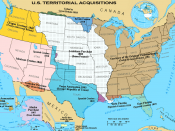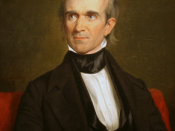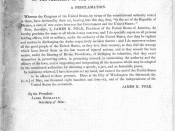Between the years, of 1815 and 1910 the United States began to indulge in the process of
aquiring foreign land. Their interests centered around strategic, moral, and political interests more
so than economic desires. These American goals were illuminated in the election of 1844, when
expansionist James K. Polk was inaugerated into office. His values and ambitions paralleled those
of the American people. This stimulated the territorial expansion of the United States during the
ninenteenth century. Therefore, the concept of " Manifest Destiny" developed, which stated
that God intended for Americans to control the entire North American continent and sophisticate
or civilize it.
In 1844, the prominent Whig leader Henry Clay, was competing with James K. Polk to
become president of the United States. Polk known as "Young Hickory" wasn't a stranger to
politics. He was Speaker of the House for four years and was the governor of Tennessee for
two terms.
(Had the support of Andrew Jackson) His competitor Clay was attempting for the
third time to become president. As history repeats itself Clay lost the election 170 to 105 in
the electoral college. The key issue was Texas and his inability to construct a stong plan
cost him the election by just 5,000 votes in New York.
The Mexico cession demonstrated the United States foreign policy during this era.
Texas had been part of Mexico, but it rebelled and became independent in 1836. Texas
greatly desired to become part of the United States, but this process was delayed due to
the slavery controversy. This controversy elucidated that America was more concerned
about the political and moral problems associated with accepting Texas into the union
than economic cravings. In 1845, under Polk's regime congress admitted Texas into the
United States. Mexico was alarmed and claimed that the United States...


